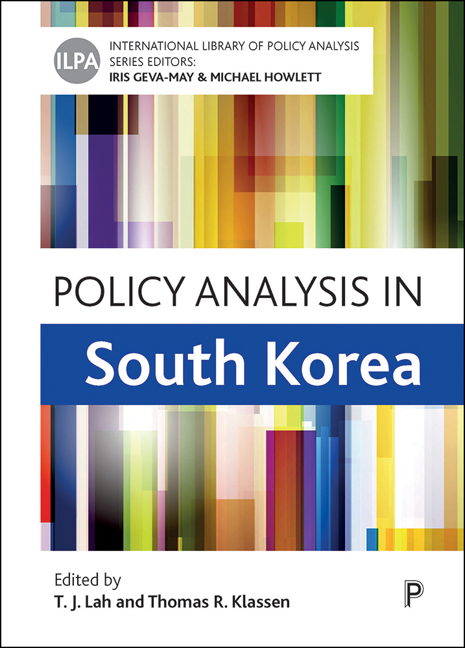Book contents
- Frontmatter
- Dedication
- Contents
- List of figures, tables and boxes
- List of abbreviations
- Notes on contributors
- Acknowledgements
- Editors’ introduction to the series
- Foreword
- Part One Overview of policy analysis in Korea
- Part Two Policy analysis by governments
- Part Three Committees, consultants, media, public inquiries and public opinion
- Part Four Parties, interest groups and advocacy-based policy analysis
- Part Five Academia, research institutes and policy analysis
- Index
four - Policy analysis and government capacity
Published online by Cambridge University Press: 18 January 2024
- Frontmatter
- Dedication
- Contents
- List of figures, tables and boxes
- List of abbreviations
- Notes on contributors
- Acknowledgements
- Editors’ introduction to the series
- Foreword
- Part One Overview of policy analysis in Korea
- Part Two Policy analysis by governments
- Part Three Committees, consultants, media, public inquiries and public opinion
- Part Four Parties, interest groups and advocacy-based policy analysis
- Part Five Academia, research institutes and policy analysis
- Index
Summary
Introduction
As government policies continue to grow in complexity, size and impact, there is a greater need to ensure government competence and the use of appropriate methodology in policy analysis, particularly due to the importance of fiscal soundness. The large programmes required to achieve policy goals entail significant time and expense, as detailed analysis of a programme's alignment with policy objectives is crucial for monitoring and analysing the progress and outcomes of the programme. For this reason, the Korean government created a policy analysis tool called a preliminary feasibility study (PFS) to oversee expenditure (KDI, 2019).
The PFS is an ex-ante feasibility assessment designed and performed by the Korean Ministry of Economy and Finance. The purpose of the PFS is to validate large-scale, publicly funded investment programmes using transparent and objective evaluation methods (KDI, 2020), which can provide helpful information in formulating the budget and establishing funding management plans (Article 38 of the National Finance Act). The Korean government designed this system to ensure the effective operation of PFSs and to build capacity through external expertise. PFSs are conducted by third-party organisations that have no particular interest in the programmes, thereby allowing them to remain objective and neutral (KDI, 2017).
To be a PFS candidate, a government programme must satisfy specific conditions. A PFS is conducted for new government programmes with a budget of ₩50 billion or higher, of which at least ₩30 billion is provided by the government (Article 38 of the National Finance Act). A PFS can also be conducted for private– public investment programmes announced by the government (KDI, 2020).
State-owned enterprises (SOEs) and quasi-governmental organisations (QGOs) either directly execute or indirectly support the government's policy programmes for providing essential goods and services related to the livelihoods and welfare of citizens. These are either corporations or non-corporate organisations that are distinct from local governments and operate through government investment or spending. SOEs and QGOs in Korea are established under the Act on the Management of Public Institutions (AMPI), a statute intended to ensure management efficiency and operational transparency to improve the quality of services for the public. As of January 2019, there were 339 SOEs and QGOs that met the qualification requirements under Article 4.1 of the AMPI.
- Type
- Chapter
- Information
- Policy Analysis in South Korea , pp. 39 - 49Publisher: Bristol University PressPrint publication year: 2023

